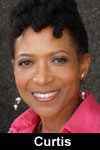Mary C. Curtis: Crisis Comes to Charlotte Schools
Posted at 3:07 pm, May 4th, 2009
Education matters.
That is the message from President Barack Obama, especially to those who think the economy is challenge enough. But even a president with a message will become distracted by events — by swine flu or torture memos or instability in Pakistan.
You need only look at last week’s Presidential press conference to know that education queries won’t soon jump to the head of the line.
Communities in crisis can’t wait.
So a recent breakfast forum in Charlotte, N.C., took the theme “education matters,” to try to figure out how a school system that was once singled out as a national big-city jewel can head off challenges that threaten it. What kinds of challenges? For starters, achievement gaps between races and socioeconomic groups and a shrinking budget.
Superintendent Peter Gorman heads Charlotte-Mecklenburg Schools, a system that is straining to cope with cuts while serving 137,000 students. It is projected that the number of schools where at least 75 percent of students qualify for free or reduced lunches will grow from 35 to 59 by August when the school year begins. It’s a statistic that a troubled economy only accelerates, particularly in a city with a hard-hit banking industry.
Gorman recently turned down an invitation from his friend, U.S. Education Secretary Arne Duncan, to join his team in Washington. On a panel at the forum — organized by the independent, nonprofit Mecklenburg Citizens for Public Education (MeckEd) — Gorman restated his commitment to offer the opportunities that every child deserves. He and his wife, Sue, have been active on community boards since Gorman came to Charlotte in July 2006. They have a daughter, Katie, who attends public schools.
Nationally, Charlotte made headlines after the 1971 U.S. Supreme Court ruling in Swann v. Charlotte-Mecklenburg Board of Education led to the busing that helped integrate schools in the district. The relatively peaceful transition contrasted with the violent resistance that accompanied school integration in Boston. The situation shook up North-South stereotypes and Charlotte basked in its moral high ground.
But in 1999, U.S. District Judge Robert Potter ruled that CMS had fulfilled its desegregation order and declared the system unitary. The results from a neighborhood schools plan implemented in 2002 closely resembled housing patterns that remain identified by race and income.
A city selling its New South, big-business profile can’t afford to let some of its young citizens fall behind. Others who spoke at the MeckEd Forum reflected the problems that bleed into a community when the school system is thought to be troubled.
Bob Morgan, president of the Charlotte Chamber of Commerce, emphasized the businesses that need an educated, creative workforce care.
Rickye McCoy-Mitchell, a district court judge, lamented the “lost potential” of the “gifted and talented young people” she sees every day. “Delinquency and recidivism goes down,” she said, with increased mentoring and educational opportunities.
The morning’s keynote speaker, Pulitzer Prize-winning columnist Leonard Pitts, has traveled the country, seeking out “what works,” educational success stories. He asked: If we know what works, why are we doing it on such a small scale?
What works, he has found, is what you would expect: smaller classes, more structure and rigor, principals with the power to hire and fire, rewarding teachers who produce results, higher expectations and mandatory parental involvement.
Pitts said he knows that resources are limited. “In many cases, vision is, too.”
“Every child has a destiny; not every child gets there.”
My own son graduated from an International Baccalaureate program in one of Charlotte’s jewels, Myers Park High School, which has made Newsweek’s list more than once. I was able to move to a district where there would be no surprises. My job gave me the freedom to be there when I was needed and least expected.
I am a believer in public schools who never attended one. In fact, one of Pitts’ happy endings was familiar to me. St. Francis Academy in Baltimore is a high-school with high rates of poverty – and success. The Catholic school, founded in 1828 by a black order of nuns to educate children of color, sits in the shadow of a prison. That doesn’t hinder the dreams of its students.
That order of nuns, the Oblate Sisters of Providence, taught me in grade school; my sister earned her high-school diploma from St. Francis. It was an escape I am grateful for, but I know not everyone is so lucky.
So now Superintendent Gorman and the school board go before county commissioners with a request for the same $351 million the district got last year in one hand and a list of additional cuts – including classroom layoffs – in the other.
And I know that if inequality in public education is ignored, it will soon make its way to the top of everyone’s list.




